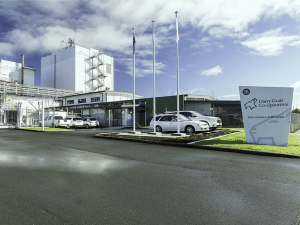Dairy goat farmers hopeful co-op will turn a corner
Farmer owners of the Dairy Goat Co-operative (DGC) in Hamilton say they believe in the business’s long-term future.
 There was backlash from farmer shareholders earlier this year after DGC asked suppliers to reduce their milk supply by one-third for the coming season.
There was backlash from farmer shareholders earlier this year after DGC asked suppliers to reduce their milk supply by one-third for the coming season.
There have been leadership changes at the Hamilton-based Dairy Goat Co-operative, which has been struggling financially in recent years.
Chief executive David Hemara left the co-op a month ago. Shareholders have been told that chair Campbell Storey will step down from the role at DCG's annual meeting in September.
Former chief executive Tony Giles has been appointed as acting CEO.
There was backlash from farmer shareholders earlier this year after DGC asked suppliers to reduce their milk supply by one-third for the coming season.
In March, Hemara told Rural News that DGC has advised its shareholder suppliers that it will call for less milk in the 2024/24 season than shareholders would normally expect to supply.
“While the final amount of milk per shareholder is yet to be finalised, we have advised shareholders that we expect that they will be asked to reduce supply to around two-thirds of normal level.
“This reduction is necessary to better balance incoming milk against forecast product sales for 2024/25. This is a continuation of a cap that we have applied for several seasons and reflects changing demand levels in some markets since Covid.”
Hemara said that the global supply/demand situation for goat milk has been impacted by four key factors; Declining birth rates internationally, sales channels that have changed during covid – including the Daigou informal sales channel to China and cost of living pressure in many economies. There has also been a structural change in the China consumer market where over the last four years China consumers have moved strongly to support Chinese domestic brands. This same impact has occurred in the infant formula segment, he added.
“At present, our view is that there is more goat milk than demand globally. We recognise that this balance can and does change over time and we have historically experienced periods of oversupply and under supply of milk.”
OPINION: "We are back to where we were a year ago," according to a leading banking analyst in the UK, referring to US president Donald Trump's latest imposition of a global 10% tariff on all exports into the US.
DairyNZ says the Government’s proposed Resource Management Act reform needs further work to ensure it delivers on its intent.
Overseas Trade Minister Todd McClay says he's working constructively with the Labour Party in the hope they will endorse the free trade agreement (FTA) with India when the agreement comes before Parliament for ratification.
Donald Trump's latest tariff tantrum has again thrown the world of trade into a new round of turmoil and uncertainty, and NZ is caught up in it.
The third edition of the NZ Dairy Expo, held in mid-February in Matamata, has shown that the KISS principle (keep it simple stupid) was getting a positive response from exhibitors and visitors alike.
Twenty years ago, South African dairy farm manager Louis Vandenberg was sent to a farm in Waikato to provide training on Afimilk technology.

OPINION: A mate of yours truly reckons rural Manawatu families are the latest to suffer under what he calls the…
OPINION: If old Winston Peters thinks building trade relations with new nations, such as India, isn't a necessary investment in…